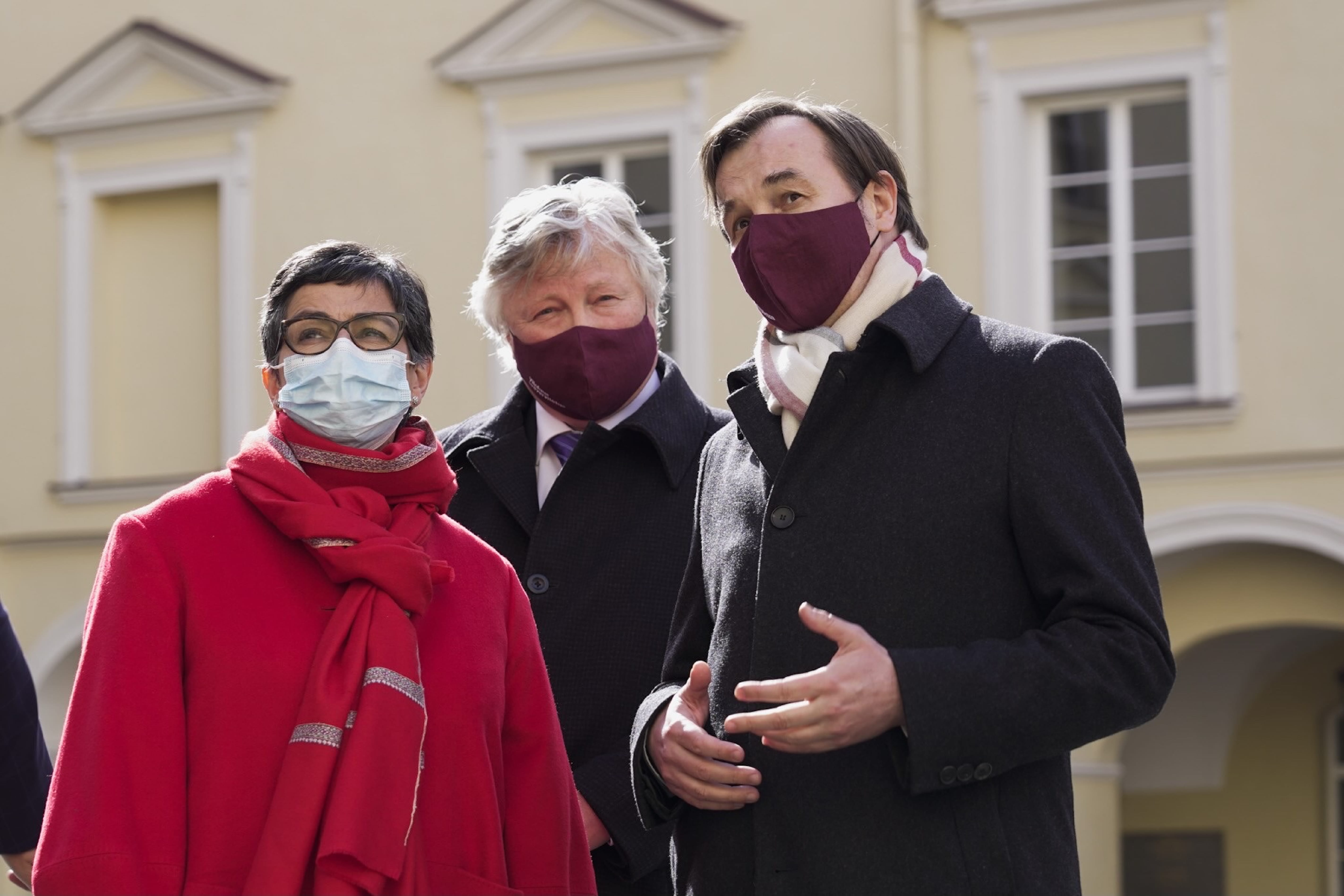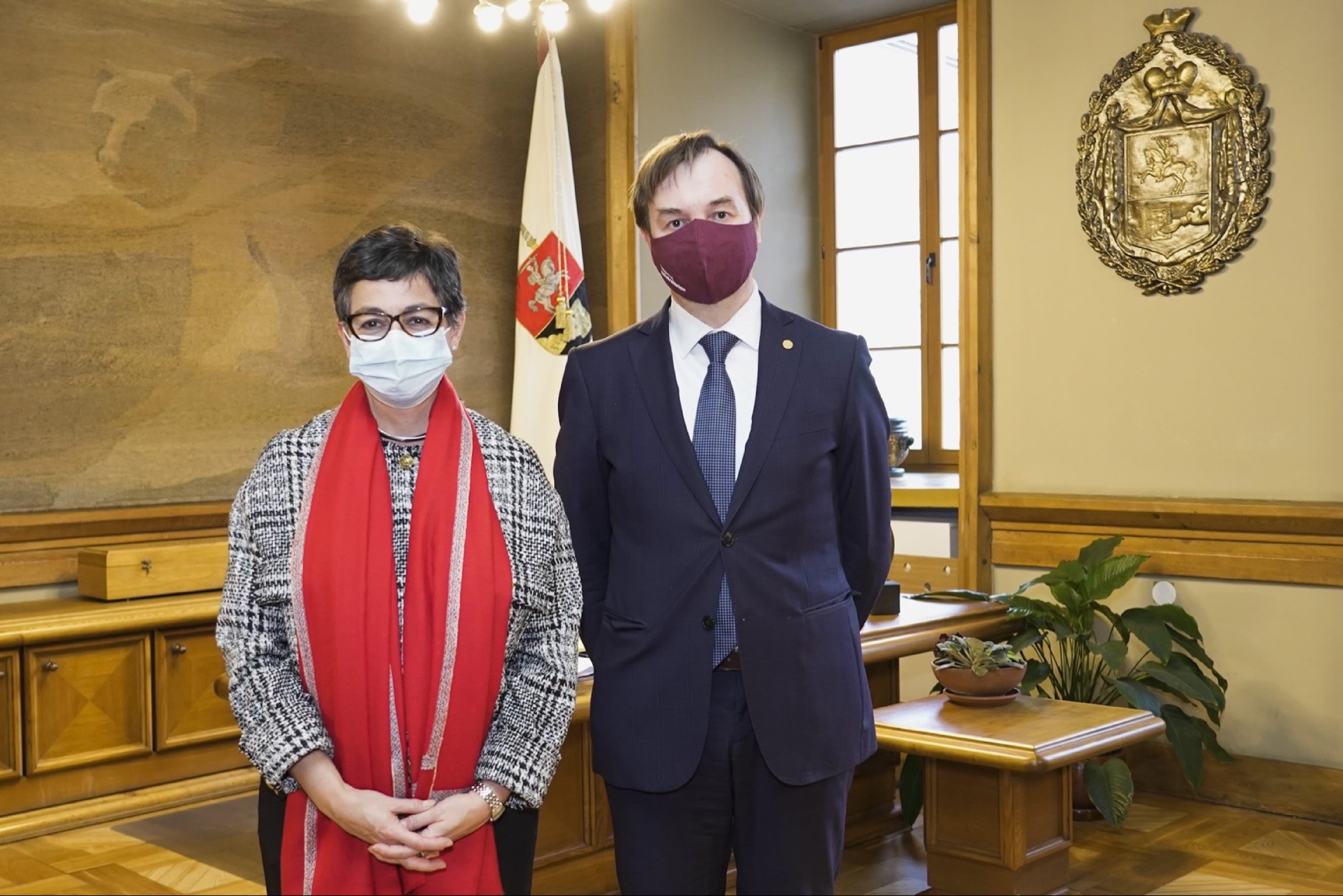Arancha González Laya, Minister for Foreign Affairs of the Kingdom of Spain Emphasised the Importance of Gender Equality on a Visit to Vilnius University
 During her visit to Vilnius University (VU), Ms Arancha González Laya, Minister for Foreign Affairs, European Union and Cooperation of the Kingdom of Spain, met with the rector of the University Prof. Rimvydas Petrauskas, visited the VU Life Sciences Centre (LSC) and took part in a virtual discussion with students. The discussion on women’s leadership in foreign policy was moderated by Prof. Dovilė Jakniūnaitė (Institute of International Relations and Political Science (IIRPS) of Vilnius University).
During her visit to Vilnius University (VU), Ms Arancha González Laya, Minister for Foreign Affairs, European Union and Cooperation of the Kingdom of Spain, met with the rector of the University Prof. Rimvydas Petrauskas, visited the VU Life Sciences Centre (LSC) and took part in a virtual discussion with students. The discussion on women’s leadership in foreign policy was moderated by Prof. Dovilė Jakniūnaitė (Institute of International Relations and Political Science (IIRPS) of Vilnius University).
Prospects of Cooperation Between Researchers Discussed
On her visit to VU LSC in Saulėtekis, Ms González Laya met with the director of the centre Dr Gintaras Valinčius, student representatives and researchers. Ms Laya was shown around the VU LSC infrastructure and learned about its history.
“The visit of the Minister of the Kingdom of Spain demonstrates that VU LSC has an international trust. We are proud that our researchers’ achievements are valued at the highest level globally,” Dr Valinčius noted.
Ms González Laya spoke highly of VU LSC’s objective to become the leading international centre specialising in gene editing. She emphasised that investments in life sciences infrastructure are one of the most successful, and the modern laboratories of the centre meet the highest standards. “In Ms González Laya’s opinion, VU LSC is a perfect example of how important timely investments enable Lithuania to grow its intellectual capital which in turn creates added value in the world,” Dr Valinčius said.
During the visit, the bilateral agreement between Lithuania and the European Union on the promotion of scientific cooperation and relationship maintenance was discussed. The cooperation would also include a joint scheme of doctoral studies and would provide possibilities for Lithuanian researchers to use the big research infrastructure of Spain.
Gender Equality – Part of Foreign Political Agenda
In a wide-ranging discussion on Women’s Leadership in Foreign Policy with the students and community members of VU moderated by Prof. Dovilė Jakniūnaitė of IIRPS at VU, the visiting minister discussed the importance of women in global policy and the feminist development of foreign policy. Ms González Laya stressed that variety in all areas, including gender, helps create a more sustainable society.
“Engaging in international politics, women contribute to diversity of the global community. A society based on equality becomes the strength and the standard of the 21st century. Gender equality is what makes us stronger in creating all-encompassing well-being. If any part of society is absent in an international relationship, the global community will not be strong and nor will it be represented sufficiently. For this reason, we must demonstrate variety and balance and involve as many women in politics as possible,” Ms González Laya argued.
The politician emphasised that the feminist movement is not a fight against, on the contrary, in her words, feminism fights for a strong society which can provide equal economic and social opportunities and rights and give equal education to everyone.

“The feminist foreign policy is not about pink documents. By contrast, an equality-based global approach includes women’s problems on the international agenda, ensures women’s engagement in foreign policy development, and shares expert experience with other countries,” the Minister said of the advantages of gender equality.
The Minister for Foreign Affairs of the Kingdom of Spain personally contributes to initiatives promoting gender equality. One of them is the organisation “SheTrades” established in 2015 which brings together female entrepreneurs from 25 countries.
“The idea to set up the organisation came after I realised that only one in five female entrepreneurs exports her products to other countries, though 45% of business developed in the world is owned by women. Then I asked rhetorically: is this because women do not want to export their products? Maybe the reason is that businesswomen who want to engage in export face great challenges? All these questions and the situation made me take the initiative and do something to contribute to women’s empowerment in the field of economy which is comprehensively beneficial to everyone,” the diplomat emphasised during the special discussion.
You can listen to the whole discussion with Ms González Laya here.